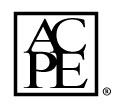| EVALUATION LINK >> | REQUEST PARKING » | MAP & DIRECTIONS » |
|
|
ARB 337
|
ARB 406
|
ARB 469
|
|
SESSION 1
12:15 pm – 1:00 pm
|
Justin Liedke, Pharm.D Treatment of Distal Deep Vein Thrombosis (DVT) |
Julie Hubbard, Pharm.D.
Liver Transplant for Cholangiocarcinoma |
(Presenting Virtually)
Arsany Gadallah, Pharm.D.
The Use of Direct Oral Anticoagulants in Obese Patients |
|
1:00 pm – 1:05 pm
|
Break for Transition between Speakers
|
||
|
SESSION 2
1:05 pm – 1:50 pm
|
Karishma Desai, Pharm.D.
The Use of Ketamine for Continuous Analgosedation in Critically Ill Patients |
Roberto Montealegre, Pharm.D.
Steroids in Acute Respiratory Distress Syndrome (ARDS) |
Samantha Grimm, Pharm.D.
Is there Benefit in Administering Sodium Bicarbonate Routinely to Patients with out of Hospital Cardiac Arrest? |
Registration is free, but is required in advance. Due to limited space, only those participants who register before 5:00 PM on Friday, December 11, 2020 will be able to request parking access on campus.
PARKING: To request parking, please first register for your desired sessions. Then, complete the parking questionnaire using the link above, or complete your parking request by clicking here>>>. If you do not request parking on our campus, or if you do not submit your request by the deadline, you will be re-directed upon arrival.
ATTENDANCE: All live participants will be required to sign in on the paper sheets, located within each room. Paper sign-in sheets will be reconciled against completed evaluations. Attendance for the virtual sessions will be captured once a participant joins the session and will be reconciled with completed evaluations. Any sessions that you did not attend will be removed from your account within two weeks following the seminars.
CPE CREDIT: Immediately following the presentation, registered participants will receive an email with a link to the evaluation. Within one week after attending the session, participants must complete this online evaluation. The CPE Administrator will submit each participant’s NABP number and date of birth combination to CPE Monitor for continuing education credit, no later than two weeks after the live presentation. Only ONE session may be claimed for each time block. If multiple concurrent sessions are claimed, or if a session is claimed that is not reflected on the paper sign or the attendance roster within Microsoft Teams Meeting, the offending participant forfeits CE credit.
SPECIAL ACCOMMODATIONS
Attendees of all abilities are welcome to participate. If you require reasonable accommodations, please notify Nicole Fields via email at Nicole.Fields@uhsp.edu in advance so that she may secure resources as soon as possible. Every effort will be made to make accommodations where necessary.
Date: Dec 16, 2020 12:00 PM - 02:00 PM
Fee
CE Hours
Activity Type
- Knowledge
- What is the difference in the risk of recurrence of VTE?
- What is the difference in the risk of PE?
- What is the difference in the risk of bleeding?
Objectives
- Describe the risks and complications associated with untreated distal deep vein thrombosis (DVT).
- Discuss the evidence regarding the safety and efficacy of anticoagulation for distal DVT.
Speaker(s)/Author(s)
|
Justin Liedke, Pharm.D. |
Activity Number
0033-0000-20-089-L01-PCE Hours
Location
Objectives
- Identify patients with cholangiocarcinoma (CCA) that would meet transplantation criteria after completion of The Mayo Protocol
- Select the appropriate neoadjuvant chemotherapy regimen for cholangiocarcinoma patients
Speaker(s)/Author(s)
|
Julie Hubbard, Pharm.D. |
Activity Number
0033-0000-20-086-L01-PCE Hours
Location
Objectives
- Identify pharmacokinetic and pharmacodynamic changes in obesity and their impact on Direct Oral Anticoagulant (DOAC) use.
- Summarize the evidence regarding the utilization of DOACs in obese patients.
- Discuss evidence-driven recommendations for the use of DOACs in obesity.
Speaker(s)/Author(s)
|
Arsany Gadallah, Pharm.D. |
Activity Number
0033-0000-20-090-L01-PCE Hours
Location
Ketamine is re-emerging in practice as it provides unique benefits to certain mechanically-ventilated populations in the ICU setting, however its use is not well outlined in the current SCCM Clinical Practice Guidelines.
My aim of this CE activity is to provide my audience with primary literature-based evidence to help pharmacists understand and implement the use of ketamine in the ICU.
Objectives
- Identify the benefits and adverse effects associated with the use of ketamine in mechanically ventilated, critically-ill patients.
- Compare the use of continuous ketamine infusions in the ICU with the standard of care and its impact on analgosedation management.
- Summarize the data related to the efficacy and safety of ketamine as an option for analgosedation in mechanically ventilated patients in the ICU.
Speaker(s)/Author(s)
|
Karishma Desai, Pharm.D. |
Activity Number
0033-0000-20-088-L01-PCE Hours
Location
Objectives
- Identify the place in therapy for corticosteroids in ARDS .
- Compare and contrast the hyperinflammatory and hypoinflammatory phenotypes of ARDS.
Speaker(s)/Author(s)
|
Roberto Montealegre, Pharm.D. |
Activity Number
0033-0000-20-087-L01-PCE Hours
Location
Objectives
- Identify patients that may benefit from sodium bicarbonate administration in the setting of cardiac arrest.
- Describe the clinical outcomes seen in the literature that may support the use of sodium bicarbonate in cardiac arrest patients.
Speaker(s)/Author(s)
|
Samantha Grimm, Pharm.D. |
